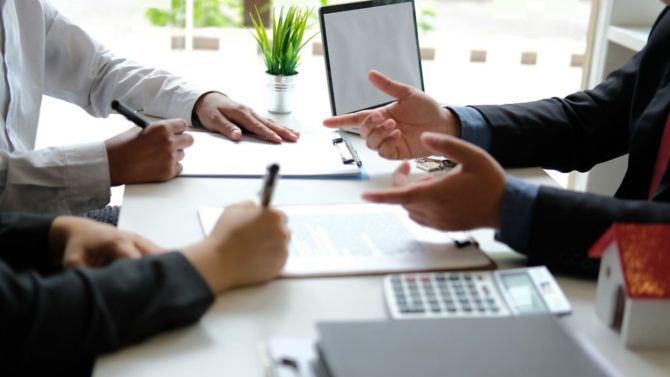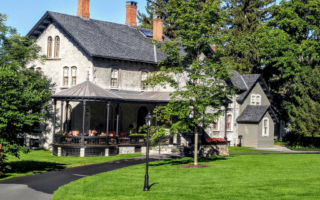Buying a French Property if you can’t be there in person

What happens if you buy a French property but can’t make it to the notaire’s office in France?

As local lockdowns are being declared across France and in parts of the UK, it’s once again become difficult for Uk buyers to travel to France to complete on property purchases. Fabienne Atkin of Heslop & Platt French law specialists runs through the options for buying a French house, from afar.
Preparing a power of attorney
A completion meeting needs to take place at the notaire’s office, but sometimes it is not possible for all parties to attend the meeting. In such cases, it is usually possible to be represented by virtue of a power of attorney which will have been completed in advance. The procedure for completing a power of attorney can vary, depending upon a number of factors.
A power of attorney works by allowing someone to represent you. In general, that representative could be a friend or relative who is able to attend the meeting at the notaire’s office, but invariably it will be one of the notaire’s staff. It cannot be the notaire.
If there is a full lockdown in place, meaning none of the staff can attend the office, it would no longer be possible to complete a deed at all by power of attorney.
To complete a power of attorney, the party would usually need to have the signature witnessed by a suitable authority. In France this could be a notaire; in the UK it would be a notary public, although some solicitors may be able to do it.
Most solicitors would be reluctant to witness a signature to a document in another language. Naturally, if you have instructed a firm of solicitors with a specialism in French law it is reasonable that they should be able to assist.

Power of attorney: The legalisation process
It is often necessary to submit the power of attorney to a legalisation process known as the ‘apostille’ stamp. This stamp is issued by the Foreign & Commonwealth Office (FCO), and works as a validation of the document so that it can be used overseas.
In practice, it is a validation of the signature of the person who witnessed your signature to the power of attorney. This is a major reason why only a notary public or suitably experienced solicitor should be expected to witness your signature; they will alerady be recognised by the FCO.
Once a power of attorney has been signed and witnessed, and submitted to the FCO for legalisation with the apostille stamp, the original paper version can be returned to the notaire to allow the transaction to complete. Scanned versions are not acceptable.
Digital signature
Electronic signature of deeds of sale is a common practice and most notarial offices in France are equipped with a system whereby the deed is projected onto a screen and the parties sign the deed electronically via a tablet.
While this simplifies the signtaure process, the parties are still required to attend a completion meeting at the notaire’s office where the notaire will read the deed and witness the electronic signature of the deed by the client.
With the introduction of the restriction on movement and social distancing measures during the Covid-19 pandemic, digital signature has become an increasingly popular tool. It allows parties to sign most documents electronically, including the initial sale contract – or the most common form of power of attorney (procuration sous seing privé) which is widely used in property transactions.
Importantly though, the final deed of sale or a power of attorney in connection with an off-plan propeerty transaction cannot be signed that way as they are documents of authentic form and the usual requirement for signature of such documents is that they’re signed in front of a notaire.
In practice, the notaire will download the power of attorney (or any other document to be signed) and the client details onto the system. An email will then be send inviting the client to access the portal. For added secutiry, the client will receive the password by SMS> The client will then be invited to download a copy of their passport for verification purposes and read each page of the document.
Once the whole document is read, the signatory will be asked to give their consent and sign the document electronically. The notaire will then receive notification of the signature by the client.
However, if the resurgence of the pandemic is such that the notaire and their staff are prevented from meeting, then the sale could not complete as the deed of sale being an ‘acte authentique’ cannot be signed digitally, as explained above.
Videoconference
To remedy this, an exceptional yet temporary measure was introduced by the French government during lockdown allowing notaires to witness the remote signature of deeds, and more precisely signature of authentic deeds, via a videoconferencing or ‘signature à distance’ system.
Until 10 August, it was possible to sign an acte authentique remotely. The signature process follows the more traditional face-to-face signature meeting insofar as the notaire and the client attend the meeting at the same time, albeit remotely via a secure videoconferencing system.
It is regrettable that it is no longer possible to witness signature of authentic deeds via video conference for now. However with France now in the throes of a second wave of the Covid-19 pandemic, it’s possible that the practice will resurface in the not-too-distant future.
Fabienne Atkin is an Associate Solicitor at Heslop & Platt (part of Ashtons Legal)
___________________________________________________
If you found this useful, you might also like:
Has my tax status changed because of Covid-19?
How to get the best service from your French estate agent
___________________________________________________
Share to: Facebook Twitter LinkedIn Email


